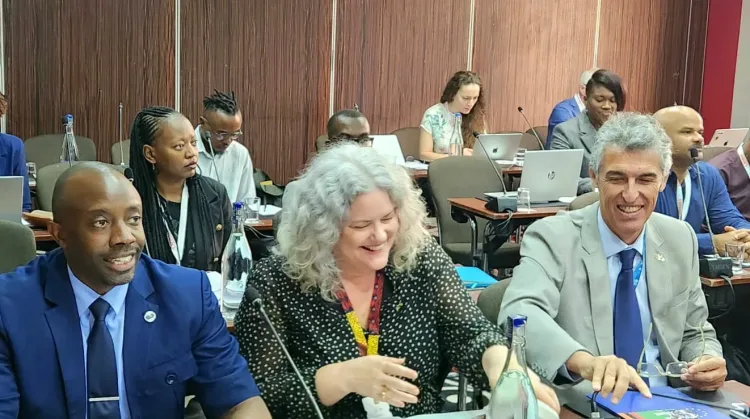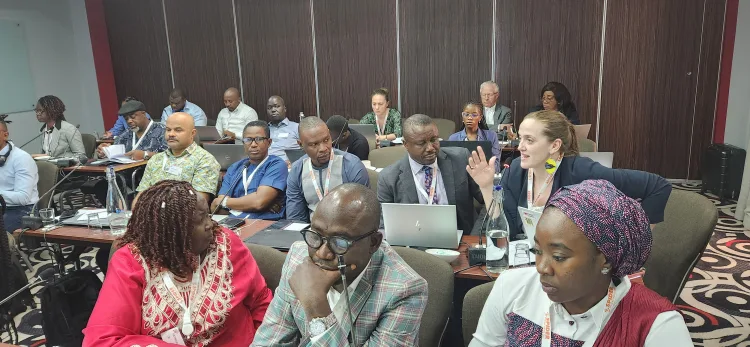The intensive four-day regional peer-to-peer capacity-building workshop (2023-A cohort) took place (March 18-22) in Lusaka, Zambia. The participants included seven of the 43 National Regulatory Organisations (NRAs) covered by iPRIS and representatives from the Regional Regulatory Organisations (RROs), in Africa including CRASA, WATRA, ARTAC and EACO (NRAs). The NRAs representatives include delegates from Kenya, South Sudan, Eswatini, Zambia, Sierra Leone, Nigeria and Namibia. This peer-to-peer capacity-building session followed the intensive Europe Regional session held in November 2023 in Sweden.
To be part of iPRIS, a country has to be part of a Regional Regulatory Organisation (RRO), notably CRASA, WATRA, ARTAC, and EACO. RROs are the regional governing bodies responsible for developing and enforcing ICT regulations, policies, and standards to promote fair competition, ensure consumer protection, and foster development and innovation within their respective sectors.

Eng. Choolwe Nalubamba, Director General of ZICTA, Susanna Hughes from the Embassy of Sweden in Zambia, and Claudio Bacigalupi from the European Union. Photo credit: iPRIS
During the opening on Monday 18th March, Claudio Bacigalupi from the European Union underscored the importance of collaboration in achieving regional harmonisation and creating a more conducive environment for innovation, investment, and cross-border digital services.
Bacigalupi further added, “We want to have peer-to-peer cooperation between the European Union and African ICT regulators and this is of utmost significance in achieving regional harmonisation. We are very happy to collaborate with Sweden and Luxembourg on this task; their collaborative approach can bring considerable benefits, including a more seamless digital ecosystem, enhanced Cross Border Services and greater opportunities."
Susanna Hughes from the Embassy of Sweden in Zambia remarked, “As you may know, even though Africa's share of the world's population is now 17%, its share of global trade is only 3%. There are many challenges to strengthening regional trade in order to achieve the aspirations of the African continental free trade area. She stressed the importance of ICT regulation as one of the important parts of the puzzle towards creating an interconnected digital ecosystem. “It's clear that better regional ICT harmonisation can strengthen cross-border digital services and economic growth. So while the challenges are many, the potential benefits are great”, she remarked. In her conclusion, Susanna Hughes stated, “As regulators, you will have an important responsibility to encourage competition while also ensuring digital inclusion and accessibility.”
During his address, Eng. Choolwe Nalubamba, Director General of ZICTA and host for the week stated, “Zambia has been one of the longest beneficiaries of the project, and there are a few issues that we can point to that we have benefited from this partnership, which include the work that we're doing under the digital financial services.”

The second day of the iPRIS Africa Regional peer-to-peer capacity building workshop for the 2023 A cohort) included sessions on cybersecurity, risk assessment for 5G networks, project management, inclusion and broadband deployment.




iPRIS aims to bridge the digital divide by boosting the capacities of African telecommunications regulatory authorities through peer-to-peer learning. The regulators participating in the project include National Regulatory Authorities and Regional Regulatory Organisations across sub-Saharan Africa.
iPRIS is implemented by SPIDER (the Swedish Program for ICT in Developing Regions), the Swedish Post and Telecom Authority (PTS), and the Luxembourg Regulatory Institute (ILR). In collaboration with the African Regional Regulatory Organisations, the implementers support the participating National Regulatory Authorities to achieve their strategic change initiatives.
iPRIS is funded by the European Union, Sweden, and Luxembourg as part of the Team Europe Initiative “D4D for Digital Economy and Society in Sub-Saharan Africa” (Code: 001).
[et_pb_section fb_built="1" admin_label="section" _builder_version="4.16" global_colors_info="{}"][et_pb_row admin_label="row" _builder_version="4.16" background_size="initial" background_position="top_left" background_repeat="repeat" global_colors_info="{}"][et_pb_column type="4_4" _builder_version="4.16" custom_padding="|||" global_colors_info="{}" custom_padding__hover="|||"][et_pb_code _builder_version="4.23.1" _module_preset="default" global_colors_info="{}"][/et_pb_code][et_pb_text admin_label="Text" _builder_version="4.23.1" background_size="initial" background_position="top_left" background_repeat="repeat" global_colors_info="{}"]
Alexandra Högberg from SPIDER Center interviewed Thomas Mohamed Jusu - Manager Frequency Planning and Spectrum Management; National Communications Authority, Sierra Leone (NatCA), along the Sweden 2023 phase. In this interview, Thomas Mohamed Jusu weighs in on spectrum management tools and quality of service instruments.
This interview has been edited for clarity and readability.
Thomas Jusu: I'm Tomas Mohammad Yousuf from Sierra Leonne National Communications Authority. I am the manager for frequency planning and spectrum management.
AH: How can regulators contribute to the advancement of the ICT sector in Africa?
TJ: In terms of the sector, the regulator's the custodian of the market. We regulate all aspects of the ICT sector. For Siera Leone in particular, not only mobile, every sector of the ICT is under our purview. So, regulators determine the code of the markets, because we have our main objective, we have to be very much professional, we have to give respect to operators because they are investing their money, we have to have integrity for ourselves as regulators, then there should be fairness in the markets, and we give room for innovation. At the end of it, it all comes down with transparency.
If the regulator is transparent, then you will see how new entrants will be in the market and how the existing ones will continue to invest in the market, which will bring in a lot of employment to the citizens, good service to the citizens as well our customers at the end of the day, we all make good use of the services they provide, even though we are regulated, where we are all in the market as well. So, having a good regulation as a regulator will encourage the investors who primary operators of the market to invest more and other new entrants to come into the market, which will end up to impact the good citizens. So that is supposed to be the role of the regulator in every country so that we can have a good environment in the ICT sector.
AH: What specific challenges does your country/region face in the current global telecommunication landscape? And how will your change initiatives address this?
TJ: A lot of challenges specifically on our change initiative. We have a lot of gaps in our spectrum regulations, because for example, the 5G that is now coming into the market for us, we have just given some trial resources to operators so that they can do some tests. But we have we don't have any guideline, any policy any strategy on how to license the 5G spectrum. So we are learning from this change initiative so that when we go back we can advise our administration on how we can license or whether we are going to use it but we are going with guidelines for them so that we can all come together and they can agree with us so that we can have the same path in how we go into license the 5G because we expect this 5G to have a good impact on everybody like the government, the consumers and then the operators.
So, we have to have some guidelines and policies, so that we cannot just rush into making the decision, but decisions that can have an economic impact on the country. But in terms of other challenges that we have as a sector, currently in the in the in the engineering department, we lack monitoring vehicles for us to even detect whether operators are using assigned frequency or whether they are using more than what we are assigning to them. We cannot because we don't have the tools that is really lacking right now, almost five years, what we used to have is obsolete. We have not been able to secure any new ones, we are still looking for a better price.
But the biggest thing is lack of resources to get what we need. The resources that we are getting from what we earn from this because we don't have other source of income, the only source of rigor is the regulations, the regulatory fees, we collect from operators. From COVID to now, it has been very challenging, we cannot add prices, because it will negatively impact on the consumers. So, inflation has caught down to our income. What we used to earn $400,000 is more or less like 50% cut down. But we cannot just change it overnight, because it will negatively impact consumers and the markets and that will give a negative signal to the government. So, government is not allowing us as regulators. Whatever we want to change, you have to go to government for approval, go to the parliament. So it is difficult for so our source of income has dropped, and that has caused a lot of challenge for us to acquire some tools which will empower us to regulate the industry very well.
AH: Is there anything else you would like to add?
TJ: For Sierra Leone, basically, if there is a need and there is room for support, we are pleading to any, whether it's regulatory body, whether it is vendors, whether operators, big operators that can help us with spectrum management tools, quality of service tools, which are the primary for any operator. All other departments depend on these two departments. These two departments provide better service for the consumers and the government as well, because if we have tools to monitor, tools to manage the spectrum, then the impact will be very good for everybody. But the market now, more or less the operators, they are free to do everything because we lack the equipment to go after them. It’s just on paper, we just call them talk to them, but how can we go out there and see that what they are doing is within the law. That is what is really challenging for us. So we are asking any good samaritan that will come to our aid, if there is anything they have that they all they are not using, we can make good use of as operator, we are pleading for that.
AH: Okay, thank you so much.
[/et_pb_text][/et_pb_column][/et_pb_row][/et_pb_section]
Borgarfjordsgatan 12, Kista,SWEDEN
Postal Address: Stockholm University, Department of Computer and Systems Sciences/DSV, SPIDER, P.O Box 1073, SE-164 25 Kista, Sweden
Copyright © 2025 iPRIS. All rights reserved.